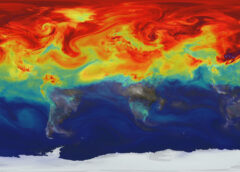
Credits: NASA’s Scientific Visualization Studio / NASA’s Global Modeling and Assimilation Office
NASA and the Federal Emergency Management Agency (FEMA) will co-host the Alliances for Climate Action, a virtual series to address rising demand for accurate, timely, and actionable information at a time of rapid global climate change. The first event, featuring NASA Administrator Bill Nelson, will take place noon EDT Wednesday, Oct. 6, and will livestream on the agency’s website.
Attendees throughout the series will learn about progress in climate research, engage with industry peers, and identify opportunities for collaboration. The series is free an open to the public.
Nelson and other leaders in government, including elected officials, as well as representatives from nongovernment organizations and industry, will discuss opportunities during the series to help address and mitigate climate change through research and action.
“At NASA, we will always look upward and push out into the cosmos, but central to our mission is protecting the planet we call home,” said Nelson. “Right now, NASA’s researchers, scientists and technicians are on the forefront of our nation’s climate resiliency, collecting and sharing data that is used to respond to extreme weather events and predict those to come.”
The series is part of FEMA’s sixth annual Resilient Nation Partnership Network Forum, which provides an opportunity for collaboration among a diverse network of partners united in their commitment to help communities act and become more resilient toward natural disasters and climate-related events.
Discussions will occur from noon to 2 p.m. each Wednesday from Oct. 6 to Oct. 27. The series will cover the following topics:
- Oct. 6 – Our Future Vision: Leadership from FEMA, NASA, and climate leaders will lay out their vision for the future of climate action.
- Oct. 13 – When Climate Moves Communities: Participants will focus on climate migration and managed/strategic retreat.
- Oct. 20 – Stories That Inspire Action: This discussion will bring together leaders from tribal, faith-based, environmental justice, art, youth advocacy, and journalistic organizations to represent diverse perspectives and show that everyone can find their place in a community working collectively to address climate change.
- Oct. 27 – Financing Climate Action: The series will wrap up with discussions revolving around climate change-resilient infrastructure and equitable climate action.
To learn more about the event, see a full list of speakers, and register for sessions, visit:
https://alliances-for-climate-action.heysummit.com/
NASA also partners with FEMA in other ways related to climate and Earth science. Before, during and after disasters occur, NASA’s Disasters program area coordinates with FEMA and other response agencies, decision-makers, and local governments to provide Earth-observing data and applied research results. NASA data informs choices, supports decisions, and guides actions to build resilient communities. NASA’s Disasters Mapping Portal provides near-real time data on current events:
In an effort to improve access to key information, NASA recently announced its Earth System Observatory, which will design a new set of Earth-focused missions to provide key information. This data will advance scientific understanding of the changing Earth system and guide efforts related to climate change, disaster mitigation, fighting forest fires, and improving real-time agricultural processes.
Climate adaptation and mitigation efforts cannot succeed without robust climate observations and research. NASA has more than two dozen satellites and instruments observing how our planet is changing and measuring key climate change indicators, such as rising sea level, intensity of precipitation, and composition of atmospheric gases.
For more information about NASA’s Earth science programs, visit:


